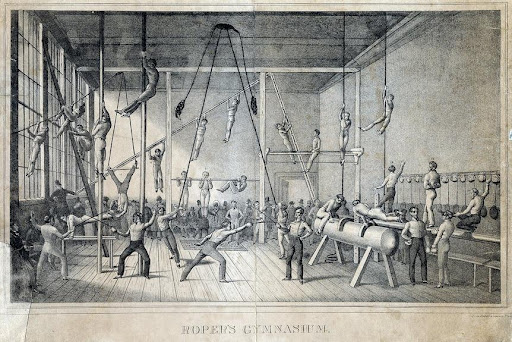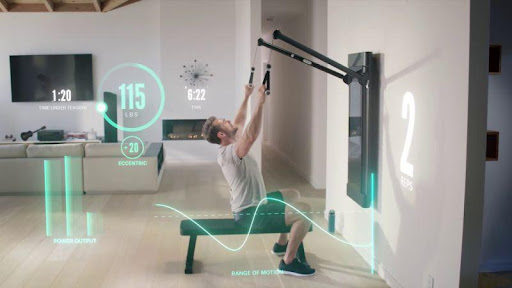Currently Empty: £0.00
Since the first treadmill was created in 1818, fitness products have advanced significantly. Over time, new technologies have emerged that have completely changed how we work out.
This post will examine the development of exercise equipment, from basic treadmills to cutting-edge AI gym equipment, and explain how it has affected our lives. Do they want to make us smart or fit?

188’s Treadmills
In order to use animals’ strength to grind grain, the treadmill was first created. The first treadmill made specifically for human use wasn’t created until 1818 by a guy by the name of Sir William Cubist. Although treadmills were created to aid with prisoner exercise, it wasn’t until the 1960s that they gained popularity in the fitness sector.
1960s stationary bicycles
In the fitness sector, stationary bikes rose in popularity in the 1960s. They were a terrific method to work out your heart without having to leave the house. The original stationary bikes were manually controlled, but electric bikes with user-adjustable resistance levels were developed in the 1980s.
1995’s Elliptical Trainers
The first elliptical trainer was created by Record in 1995. They were created to offer a low-impact cardio workout that was less strenuous on the joints than treadmill running. Elliptical trainers soon gained traction in gyms and are now a mainstay in the majority of training facilities.
2009 wearable fitness trackers
The Fitbit was the first wearable fitness tracker to be released in 2009. These gadgets allowed users to monitor their heart rate, steps, and other stats all day long. Numerous wearable fitness trackers are available on the market right now, including smartwatches that provide additional functionality like GPS tracking and music playback.
2015’s smart gym equipment
The fitness sector has undergone a change thanks to smart gym equipment, which has grown in popularity over time. The newest innovations are merged with this equipment, which is made to offer better exercise. Users may track and save workout data thanks to its internet connectivity. On smartphones, tablets, and other devices, this data is accessible through a variety of applications. Users may evaluate their development, pinpoint areas for growth, and establish objectives for themselves by tracking their workout data.

The Peloton bike, the Mirror, the Nordic Track RW900 rower, adult stress balls, and foam rollers are some common pieces of smart fitness equipment on the market right now.
• A huge touch screen that streams live and on-demand lessons is a feature of the stationary cycle known as the Peloton. Additionally, it enables users to compete with one another and monitor their development over time.
• The Mirror is a smart mirror that provides individualized coaching and interactive training. Because it can be wall-mounted and takes up little room, it is ideal for small apartments. The Nordic Track RW900 rower is an intelligent rower with a 22-inch touchscreen that enables customers to stream exercises on demand and monitor their progress.
In addition to holding and wearing electronics, smart gym equipment also includes hand grip strengtheners, fitness trackers, and smartwatches. These gadgets are made to keep track of various biometric data, including heart rate, sleep quality, and degree of exercise. They can also keep track of exercise-related data like calories burnt and distance traveled. The Apple Watch, Fitbit, and Garmin Forerunner are a few of the well-known wearable gadgets available today.
These gadgets can connect to smart gym equipment to offer a thorough exercise analysis.
Do smart home gym equipment make people active or idle?
The introduction of sophisticated and intelligent technology in the fitness sector has prompted a discussion over whether they are making us more active or lazier. Although these technologies have many advantages, if not utilized properly, they also carry certain hazards.
On the one hand, AI and intelligent technologies have made it simpler for people to maintain a healthy lifestyle. Users of smart gym equipment may tailor their training regimens by receiving individualized programs and performance-based feedback. Wearable technology with AI capabilities can capture biometric data, making it simpler for users to track their fitness goals and progress. This might result in an exercise regimen that is more effective and efficient, which would enhance health results.
On the other side, these technologies may also encourage dependence and laziness in humans. For instance, users may not be pushing themselves hard enough or mastering crucial fitness abilities if they entirely rely on wearable technology and smart gym equipment to direct their exercises.
Furthermore, people could stop pushing themselves as hard without technology if they grow too dependent on it to make decisions for them. This might result in a lack of interest for and participation in physical activity, which would eventually lead to a less healthy lifestyle.
Furthermore, improper usage of smart technology might lead to a loss in cognitive ability. For instance, users may not be improving their cognitive and problem-solving abilities if they depend too heavily on technology to direct their exercise routines.
In addition, overusing technology might reduce social connection, which is essential for well-being in general. AI and smart technologies have both favorable and unfavorable implications on health and fitness.
The users must find a balance between using technology to advance their fitness and guarding against becoming overly reliant on it. It is crucial to keep doing physical activities that test both the body and the intellect, while also utilizing technology as a tool to facilitate these activities.
FAQs about Fitness products
What is the best way to use smart technology in fitness?
Answer: Smart technology can be used to track biometric data, personalize workout routines, and provide users with feedback. However, it’s essential to use it as a tool to support physical activities that challenge both the body and mind.
Can AI and smart technology make us lazier?
Answer: AI and smart technology have the potential to make us lazier if we become too reliant on them to guide our workouts and make decisions for us. It’s crucial to strike a balance between utilizing technology and engaging in physical activities that require cognitive and problem-solving skills.
What are the benefits of using gym equipment?
Answer: Gym equipment can provide users with a variety of workouts, allowing them to target specific muscle groups and improve their overall fitness. Additionally, gym equipment can be used to challenge the body and develop essential fitness skills.
Is it necessary to engage in physical activities to stay healthy?
Answer: Yes, engaging in physical activities is crucial to maintaining good health. Physical activities can improve cardiovascular health, build muscle strength, and reduce the risk of chronic diseases. It’s recommended to engage in at least 150 minutes of moderate-intensity physical activity per week.

